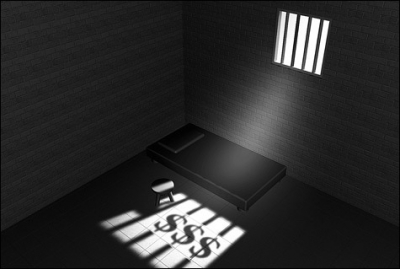Housing illegal immigrant prisoners in California becoming expensive for taxpayers

According to a recent Modesto Bee editorial, the costs associated with housing imprisoned illegal immigrants who commit offenses in California are on track to becoming an unfunded liability for the state's taxpayers, due in part to the federal government fleeing from their responsibility to share in those very costs.
"The cost to imprison illegal immigrants convicted of crimes should be a shared responsibility. Since 1995, Congress has forced the federal government to pay a per-diem cost based on prison guard salaries. But now the federal government is resisting," the Bee said.
The editorial goes on to say that of the 156,000 inmates in the California prison system, there are 18,300 who are deportable. This means that just a little more than 10 percent of the state's prison system is made up of illegal immigrants that should be deported. As the Bee notes, President Obama wants to make significant cuts to the reimbursement program because of the fiscal situation that the nation as a whole faces. According to the editorial, the administration wants to give the prison system $32.8 million, which is a far cry from $88.1 million the state desires.
While one of the larger points of the Bee's editorial is that California should rein in its payments to its prison guard force to be more on par with other states like Texas and Florida, the piece's overall theme doesn't take away from discussing the adverse effects that come along with having the nation's highest illegal immigration population.
Even though some illegal immigrants may have come here for better opportunity and are seeking reform of what they consider an outdated immigration system, there's also the argument that other illegals will usher in a wave of new crime into the states. While border crime has actually gone down according to the Obama administration, this doesn't take away from the fact that border states actually see more crime than other states. The Center for Immigration Studies, Government Accountability Office, and FBI have all confirmed this trend. Consequently, this burdens law enforcement officials in an unnecessary manner. This is why it is reasonable to take issue with President Obama's approach of cutting the reimbursement program's funds by more than half the desired amount, which would put an already crippled state on the brink of paying more for housing illegal immigrants in state prisons.
Back when Arizona attempted to enact the controversial SB 1070, which empowered local law enforcement to check the immigration status of individuals with probable cause, the Justice Department sued on the basis that the law was "preempted by federal law and therefore violates the Supremacy Clause of the United States." Utilizing similar rationale, then, it would be logically consistent for the feds to play a more significant role when it comes to funding the housing of illegal immigrants in state prisons. Shrinking back from their responsibility is not only at odds with their stance in the SB 1070 case, but places an unnecessary burden on California's taxpayers.
Make no mistake. California's government bears its fair share of the blame for allowing illegal immigration to thrive in the state at the highest level in the nation. It's also not fair that the nation's taxpayers should bear the burden for California's illegal immigrant prisoners. With the federal government's obligation to uphold federal laws, this makes it all the more imperative to expedite their deportation proceedings and to effectively enforce existing immigration laws.



